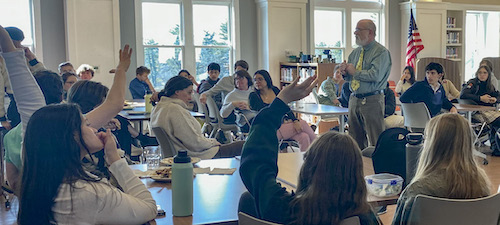
Artificial Intelligence in Schools
By Adam Rohdie, Head of School
Dr. Jim Cullen, an Upper School history teacher, holds lunchtime roundtables for students and faculty to come together to discuss interesting and controversial topics. Last week, I joined a very popular session on the impact and role of open Artificial Intelligence (AI)—specifically, ChatGPT. If you are unfamiliar with ChatGPT, it is a technology that can answer questions in essay form by scouring the internet. I asked the AI language model to write a paragraph explaining itself; here is a part of the response:
ChatGPT is an AI language model developed by OpenAI. It is a type of neural network that uses deep learning to generate text based on input it has been trained on. It has been trained on a large corpus of text data and has the ability to generate text that is coherent, grammatically correct, and relevant to the input it receives.
What has sent many teachers and school districts into a tailspin is that there is no easy way to detect whether this was written by a computer or a human. If I had not provided attribution, this could easily have been passed off as my own writing. Thus, the discussion at Dr. Cullen’s roundtable became quite robust, very quickly.
Students see this technology as “not a big deal.” Much like the smartphone, the graphing calculator, Grammarly (also a form of AI), or spell check, students see this as just another technological tool to be placed in the toolbox. Teachers, on the other hand, are a bit more skeptical. How can the 16-year-old student, overloaded with work from many classes, avoid the temptation to use this tool to create all or part of their essay on the three main causes of the Civil War? Even if you just read the output of ChatGPT and then wrote your own version, would there not be a “residue” of unauthorized aid on your assigned task? It would be well written and untraceable. By the way, ChatGPT can also solve math problems, write computer code, balance a chemical equation, and it recently was given the Bar exam in the state of New York and was able to pass it.
While the use—or misuse—of this technology has recently seen some school districts ban ChatGPT, the outcome of the GCDS roundtable was different. Students and teachers agreed that this technology is here to stay—and will only get better, more efficient, and more detailed in the future. They determined that as we learn to live with this new technology, we need to craft language that places communication and trust between students and teachers at the forefront. Therefore, a school-wide position on the platform’s acceptable use has been developed (see sidebar).
While this new technology is clearly a work in progress and will continue to evolve, the commitment to academic integrity—a commitment deeply ingrained in GCDS’s almost 100-year history—is the foundational premise we rely on for navigating the constantly changing learning environment.
GCDS Policy on Artificial Intelligence and Academic Honesty
Any use of generative AI requires instructor permission as well as acknowledgment when signing the honor pledge. Failure to disclose the use of AI is a violation of the Academic Integrity Policy.
As students enter into conversations about this new technology, we ask them to consider the following:
• Like most things, new technology comes with both positives and negatives; we are still figuring out what artificial intelligence tools mean for teaching and learning. It would be beneficial to create a think tank made up of students and faculty to further explore AI and its impact on education.
• Are you using the technology to aid research or further curiosity—or—are you using it as an inappropriate shortcut or crutch.
• The information from ChatGPT is not currently citable, and thus, right now, not a credible academic source—regardless of how reliable it seems.
• ChatGPT can give false or misleading information.
• Don’t rob yourself of the experience of learning to be a great writer.
• Academic honesty applies in all aspects of teaching and learning.
#gcdsus #gcdsacademic


.jpg&command_2=resize&height_2=85)



.png&command_2=resize&height_2=85)


.jpg&command_2=resize&height_2=85)








.jpg&command_2=resize&height_2=85)



